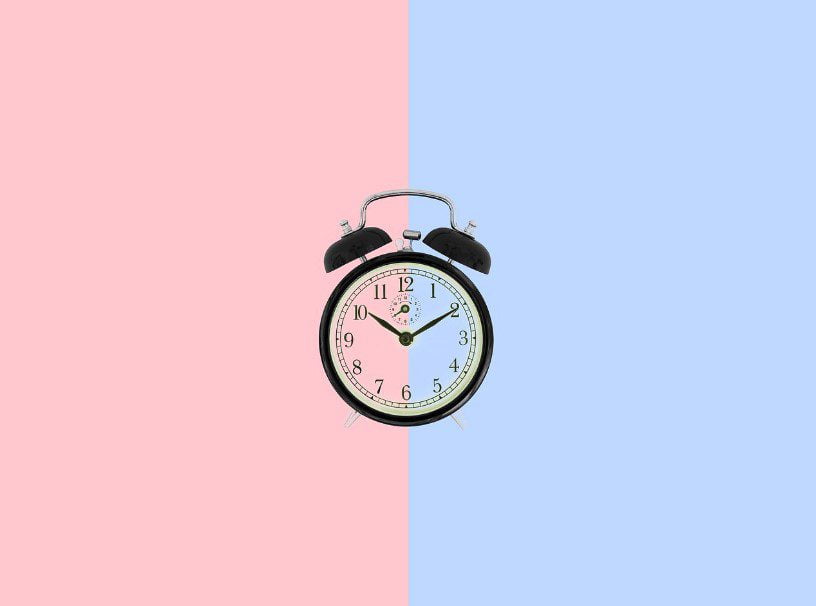When you sleep for less than the recommended hours at night, you fall victim to a condition called sleep debt or sleep deficit. Sleep debt describes the habit of sleeping for fewer hours than is clinically recommended.
By sleeping less, you can disrupt the functions of the body’s internal clock, otherwise known as the circadian rhythm. This clock is integral to the 24 hour sleep–wake cycle, and central to the functions of hormones and immunity cells!
NOTE:
Sleep should not be viewed as a luxury, but a critical factor in sustaining your health. It is integral to everything from DNA to cell functions. Sufficient and quality sleep will provide excellent immunity, detoxification of the brain, and repair of body cells.
Sleep is also crucial for memory tasks such as encoding, storage and recollection of information learned during the day. Ultimately, quality sleep is an opportunity for the brain to have a break and recharge!
What is sleep debt anyway?
Sleep debt describes the cumulative hours you spend without getting sufficient and quality sleep, and the impact this can have on your life. It is the difference between the number of hours you are REQUIRED to sleep, and the ACTUAL number of hours you sleep.
For example, if you sleep for 5 hours instead of the recommended 7 for adults, you will have a sleep deficit of 2 hours. If you do this repeatedly, let’s say for 7 days, you will have accumulated a sleep deficit of 14 hours!
And it does not stop there. If your habit persists for months and years, your sleep debt will accumulate significantly.
At first, sleep debt will leave you feeling lousy, chubby, and lazy for the better part of the day. If you allow the habit to continue for years and decades, your body will become vulnerable to complications such as hypertension, diabetes, and psychosis!
Scary I know, but between you and me, sleep deprivation is REAL, and worthy of every attention it can get.
How many hours of sleep do you actually need?

While sleep requirements may vary from person to person and age to age, it is highly recommended that 7 hours be the bare minimum for adults. The hours can stretch to 9 where possible, and more for children.
Below are the hours we should all spend sleeping, according to the National Library of Medicine:
- Newborns: 14 – 17 hours
- Infants ( – 1 years): 12 – 15 hours
- Toddlers (1 – 3 years): 11 – 14 hours
- Preschoolers (2 – 5 years): 10 – 13 hours
- Middle childhood kids (6 – 11 years): 8 – 11 hours
- Teenagers (12 – 19 years): 8 – 10 hours
- Young adults 7 – 9 hours
- Older adults 7 – 8 hours
What matters is that when you wake up in the morning, your body should feel genuinely refreshed and ready to go. The alertness you feel in the morning should stay with you throughout the day – without the need to take frequent naps!
What causes sleep deprivation?

Yes, we sleep much less today, contrasted to our peers in the last century. The allure of urban life, advances in technology, and our busy schedules are all contributing factors.
The most notable reasons for sleep deprivation include:
- Lifestyle choices such as night life, home entertainment, too much screen time, etc.
- Work demands such as meeting deadlines, night shifts, commuting, etc
- Educational demands at home and school!
- Over indulgence in substance use.
- Breastfeeding demands for nursing moms and dads.
- Sleep disorders such as insomnia, apnea, and narcolepsy.
- Medication such as alpha blockers, beta blockers, stimulants and over-the-counter prescriptions.
- Depression, anxiety and other mood disorders.
- Environmental factors such as extreme temperature, light, noise, discomfort, etc.
What are the typical symptoms of sleep debt?
Clinical tests can be used to determine if your body is experiencing the effects of sleep debt. In a study done at Washington University in St Louis (2007), it was suggested,
saliva testing of the enzyme amylase could be an indicator of sleep debt, because the activity of amylase increases in correlation with the length of time that the subject has been sleep deprived.
Besides clinical tests, there are obvious and not so obvious signs you are not getting enough sleep. The immediate symptoms are what you go through the day after you have slept for only a few hours.
- micro-sleeps
One obvious symptom is frequent micro-sleeps that you experience at work, in social gatherings, and while watching a movie.
Micro-sleeps describes short episodes of sleep that last for 30 seconds or thereabouts. What happens is that your body doses off repeatedly, and you have to jerk yourself back to wakefulness every now and then.
Micro-sleeping can also happen when you are driving, and this can be dangerous for you and other road users.
Below are other signs you did not get sufficient sleep the previous night:
- Fatigue
- Drowsiness
- Yawning
- Reduction in cognitive functions such as communication, planning and decision making!
- Memory lapses
- Poor concentration
- Irritability and mood swings
- Hallucinations
- Accidental injuries
- Low sex drive
Of course, some individuals will not display all the symptoms listed above. Their bodies can progressively adapt to sleep deprivation and give the false impression they are fine. The truth is, they are not fine.
A few people may not micro-sleep at all, and yet show signs of cognitive impairment, mood swings, and memory loss.
Also true, some individuals called short-sleepers (an equivalent of 1% of the global population), can get by with less than the recommended hours. They can get by with only 4 hours of sleep every night. And you will know it if you are one of them.
Do you think you are one of the few short-sleepers?
Think again. As long as you experience one of the symptoms listed above, or anything else related to sleep disorders, you are certainly out of luck! You are not a short-sleeper.
What are the long-term effects of sleep deprivation?
Many things can go wrong if you allow sleep deprivation to run your life. It can have a huge impact on your heart health and overall health. In the long run, it can actually lead to early death!
Below is a description of a few complications associated with insufficient sleep:
- Poor immunity:
Body immunity is only good in equal amount with the sleep you get at night. Good sleep facilitates the production of cytokine proteins to regulate the activities of immune cells, and help fight infections. Poor sleep will see the reduction in production of these proteins. Besides cytokine, poor sleep will impact the production of other antibodies and cells. A combination of these deficiencies can leave your body vulnerable to flu, cold, and multiple other illnesses, and make it hard for you to recover quickly enough from them.
- Type II diabetes & insulin resistance:
Yes, diabetes is known to cause sleep problems, and in turn, sleep problems can worsen matters for patients with diabetes. Sleep deprivation interferes with glucose production and increases insulin resistance. This in turn increases blood sugar levels in the body, which is harmful to blood vessels and general health.
Experimental studies in healthy adults have shown that partial sleep restriction (4–5 hour sleep/night over one to 14 nights) rapidly reduces glucose tolerance and insulin sensitivity.
NCBI
- Hypertension: (high blood pressure)
By normal standards, your blood pressure should go down when you get quality sleep. When you sleep for less than the recommended hours, however, your blood pressure will go up. This is especially so when you average 5 hours of sleep for many days and weeks. High blood pressure is a risk factor for heart disease and stroke.
… experimental sleep deprivation, short sleep duration, and persistent insomnia are associated with increased blood pressure and increased risk of hypertension, even after controlling for other risk factors.
NCBI
- Depression:
Moderate to acute sleep deprivation is a contributing factor to depression, precisely as depression contributes to poor sleep.
Sleep issues may contribute to the development of depression through changes in the function of the neurotransmitter serotonin. Sleep disruptions can affect the body’s stress system, disrupting circadian rhythms and increasing vulnerability for depression.
SleepFoundation
- Weight gain:
Sleeping for less hours can so easily facilitate weight gain due to behavioral triggers involved. People who sleep less are more likely to exercise less, eat more, and therefore add weight. This is particularly true in children and adolescents, who need even more sleep than older people.
… sleeping four hours a night, compared with 10 hours a night, appears to increase hunger and appetite — in particular for calorie-dense foods high in carbohydrates.
Mayo Clinic
- Psychosis:
Psychosis affects your thinking and the ability to decipher what is real and true. This can make your brain hear voices and see things which don’t exist. Some psychotic patients even get the smell of things which don’t exist. Psychosis can lead to how the brain works, leading to poor judgment and decisions.
Can you catch up on lost sleep over the weekend?

There is a common myth that you can catch up on lost sleep by sleeping for extended hours during the weekend. Well, sounds nice to the ear, but does it actually work?
Yes and no!
The truth is, catching up on lost sleep is a tricky hack, so to say. Yes, by extending sleep hours over the weekend, you will probably alleviate the cumulative fatigue that has piled for days. That is good for the general wellbeing of your body.
On the other hand, unfortunately, a weekend of sleep may not necessarily heal all the wounds of the past 7 days.
According to a 2016 study, it takes more than only one weekend to pay for 5 days of sleep deprivation.
… only 1 h of PSD takes four days to recover to their optimal level.
(PSD above stands for potential sleep debt)
Additional research also suggests sleeping-in during the weekends does not protect you from risk factors such as diabetes, hypertension, and heart disease. These ills will ferment in your body due to the 5 days a week, and years of inadequate sleep.
In brief, weekend sleep may not reverse metabolic dysregulation of a person who deliberately sleeps less during the week and more during the weekend.
Finally, your poor quality sleep is definitely confusing your body’s circadian rhythm and related hormones such as melatonin and cortisol.
What you should be doing to reduce and fix sleep debt
Prevention is the more proactive and preferred strategy when dealing with all kinds of illnesses. It is better to do the right thing for your health than wait for trouble.
In order to get back to an improved sleeping routine, try implementing the following at home:
- Tame your night time adventures.
- Create and stick to a sleeping routine that favors 7 hours of sleep.
- Train yourself to sleep at the same time in the evening, and wake up at the same time in the morning.
- Eliminate distractions such as noise and light in the bedroom.
- Go outdoors everyday to interact with nature and for physical exercises.
- Do not eat or drink less than 2 hours before sleeping.
- Eliminate electronic devices such as TVs, computers, and other digital screens from the bedroom.
- Avoid carrying out office work at home.
- Try to get a job near home.
- Seek treatment when suffering from conditions such as apnea, insomnia and depression.
Over time, you will likely return to better sleeping ways, and manage diseases and mental complications more efficiently.





Leave a Reply